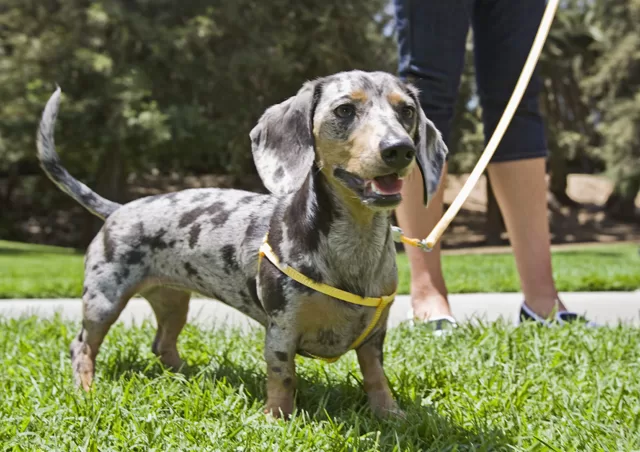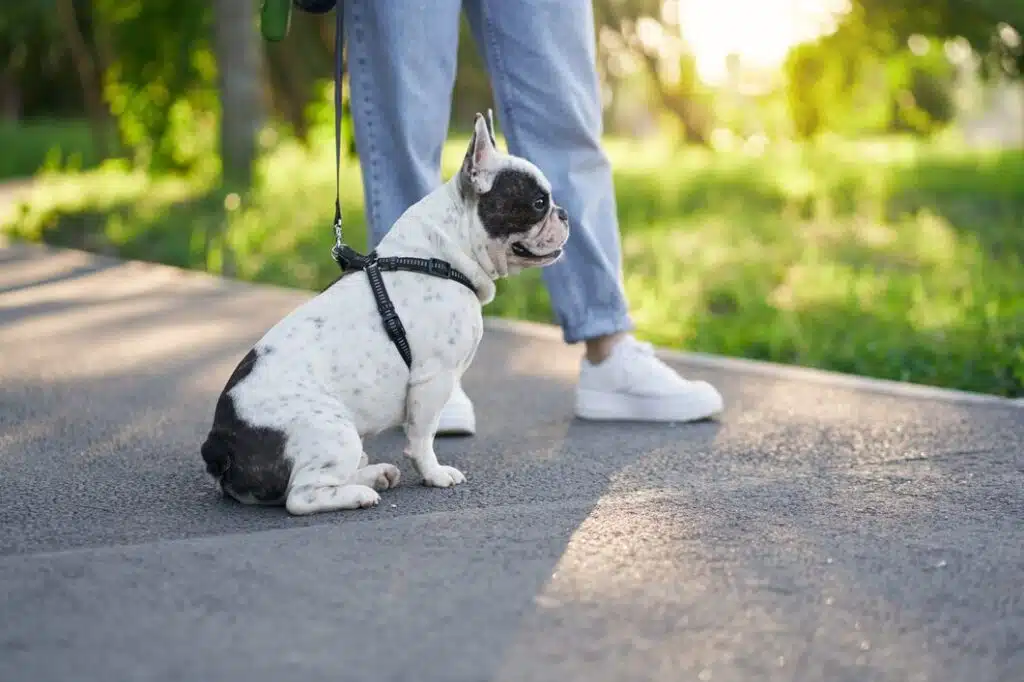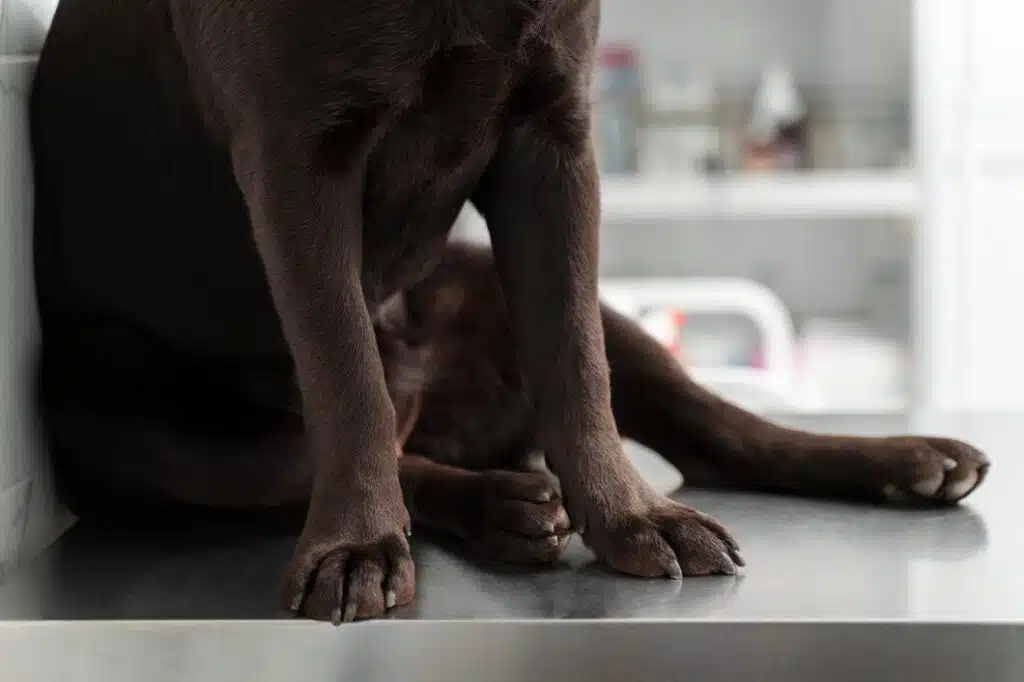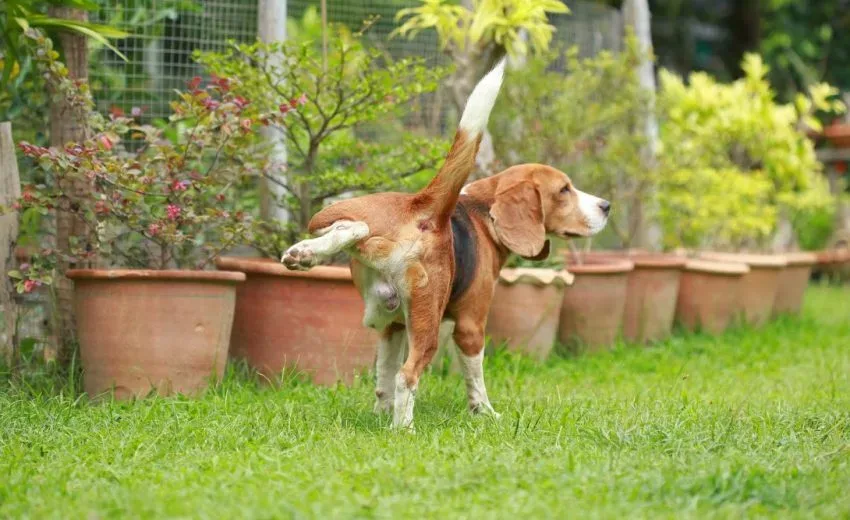It’s worrying when your dog doesn’t pee for a long time. This could mean they have a health issue or a behavior problem. Knowing the reasons and when to see a vet is key to keeping your dog safe and healthy.
Urinary retention is a big problem for dogs. It’s important to watch how often your dog pees. If they haven’t gone in over 12 hours, it’s time to act. Not peeing can cause urine to build up in the bladder, leading to serious problems.
Key Takeaways
- Urinary retention in dogs is a concerning issue that requires prompt attention.
- Potential causes range from medical conditions to behavioral factors, such as stress or changes in routine.
- Monitoring your dog’s urination habits is crucial, and seeking veterinary care is advised if they haven’t urinated in over 12 hours.
- Delayed urination can lead to serious complications, including bladder rupture and organ damage, if left untreated.
- Understanding the normal urination patterns for your dog’s size and age can help you identify when something is amiss.
Understanding Normal Dog Urination Patterns and When to Worry

As a dog owner, knowing your pet’s normal urination habits is key. The amount of time a dog can hold its urine varies by size and age. Smaller dogs often need to go more often, while bigger dogs can hold it longer. Puppies, especially, need to go out more frequently than adult dogs.
Signs of Urinary Problems to Watch For
It’s okay if your dog sometimes holds its bladder for 8 hours or longer. But, if they can’t go for a long time, watch for other signs. Look for straining, discomfort, or changes in how they pee. These could mean a urinary tract infection, bladder stones, or other serious issues that need quick action.
When Delayed Urination Becomes an Emergency
Sometimes, a dog’s inability to pee can be a real emergency. If your dog hasn’t gone for 12 hours or more and shows pain, tiredness, or loss of appetite, get them to the vet fast. Not being able to pee for a long time can cause serious problems like kidney damage or even organ failure. It needs immediate treatment.
Medical Conditions That Cause Dog Has Not Urinated

It’s alarming when our dogs don’t urinate for over 12 hours. The cause might be a serious medical issue. Let’s look at common problems that stop dogs from urinating.
Kidney disease in dogs is a big problem. It messes with fluid balance, leading to less urine or no urine at all. Bladder stones in dogs are another issue. These stones can block the bladder, making it hard for dogs to urinate.
“If your dog is unable to urinate, it’s crucial to seek immediate veterinary attention, as this could be a life-threatening emergency.”
Other issues like prostate problems in males or neurological disorders can also affect urination. It’s key to work with your vet to find the cause and get treatment fast. This ensures your pet stays healthy.
Urinary Tract Infections and Bladder Problems

As a dog owner, knowing about urinary health issues is key. Urinary tract infections (UTIs) and bladder problems can affect your dog’s health. We’ll look at symptoms, bladder stones, and prostate issues in male dogs.
Common UTI Symptoms in Dogs
Spotting UTI signs in your dog is the first step to help. Look for frequent urination, straining, blood in urine, and pain. If you see these, see your vet for a diagnosis and treatment.
Bladder Stones and Crystallization
Dogs can also get bladder stones, or calculi. These hard deposits cause pain and make urination hard. Knowing what causes stones, like diet and water intake, helps manage them.
Impact of Prostate Issues in Male Dogs
Prostate problems in male dogs can affect their bladder. An enlarged or inflamed prostate can block the bladder. This leads to UTIs, incontinence, and other issues. Quick diagnosis and treatment are vital for your dog’s health.
Dehydration and Its Effects on Urination
Keeping your dog hydrated is key for their health, including how they urinate. Dehydration can make it hard for dogs to go to the bathroom regularly. It can cause urinary retention, where they can’t fully empty their bladder.
Dehydration happens when dogs lose more water than they drink. This can be due to hot weather, more exercise, or health issues. As they lose water, their kidneys try to keep what’s left, making less urine. This can make dogs feel like they need to pee but can’t, a serious problem called urinary retention in dogs.
Also Read: Why Does My Dog Pee on My Bed? Discover the Reasons and Solutions
If your dog hasn’t gone to the bathroom for a while, look for dehydration signs. These include dry mouth, tiredness, and skin that doesn’t snap back. Giving your dog lots of clean water and watching their hydration can stop dehydration in dogs and its urinary problems.
“Maintaining proper hydration is crucial for your dog’s urinary health and overall well-being.”
In bad cases of dehydration, a vet might need to help. By watching your dog’s water intake and getting help when needed, you can keep their urinary system working right. This helps avoid serious health issues.
Behavioral and Environmental Factors Affecting Urination
Medical issues aren’t the only thing that can cause urinary retention in dogs. Behavioral and environmental factors also play a big role. These factors can greatly affect a dog’s urination habits, especially as they get older.
Stress and Anxiety Related Urinary Retention
Dogs can feel stress and anxiety just like humans do. *Stressful situations, like changes in routine or loud noises, can make a dog hold their urine.* Finding out what causes a dog’s anxiety can help solve this problem.
Changes in Routine or Environment
A consistent routine is important for a dog’s urination habits. *Big changes in a dog’s daily life or living space can mess up their urination patterns.* Senior dogs are especially affected by these changes.
Weather-Related Urination Issues
Even the weather can affect a dog’s need to urinate. *Extreme temperatures can make a dog hesitant to go outside.* Keeping an eye on your dog’s urination habits and adjusting their routine can help with this issue.
Medications and Their Impact on Dog’s Urinary Habits
As a responsible pet owner, it’s key to know that some meds can affect your dog’s pee habits. Drugs for pain, inflammation, or incontinence can lead to trouble passing urine. This is called urinary retention.
Medications causing urinary retention in dogs can be a big problem. It can cause discomfort, infections, and even serious health issues if not treated. It’s vital to talk to your vet about any meds your dog is on and watch their pee closely.
“Paying attention to your dog’s urinary habits and any changes caused by medications is essential for their overall well-being. Consulting with your vet can help ensure the right balance of treatment and management.”
If your dog has trouble peeing or shows other pee-related issues after starting a new med, tell your vet right away. They might need to change the dosage or find another treatment that won’t cause medications causing urinary retention. Acting fast can stop bigger problems and keep your dog comfy and healthy.
Conclusion
A dog’s urination habits can tell a lot about their health. It’s normal for dogs to have slight changes in how often they pee. But, if a dog doesn’t pee for a long time, it’s a big worry that needs vet help right away.
Knowing why dogs might not pee can help pet owners act fast. Issues like infections, stones, or not drinking enough water can cause problems. If your dog hasn’t peed in over 12 hours, it’s a serious emergency. You need to get them to the vet fast.
Keeping your dog’s urinary system healthy is key. Make sure they drink enough water, manage stress, and see the vet regularly. Watch your dog’s pee habits closely. If you see any big changes, get help from a vet right away. With care and attention, your dog can stay happy and healthy, avoiding serious pee problems.

